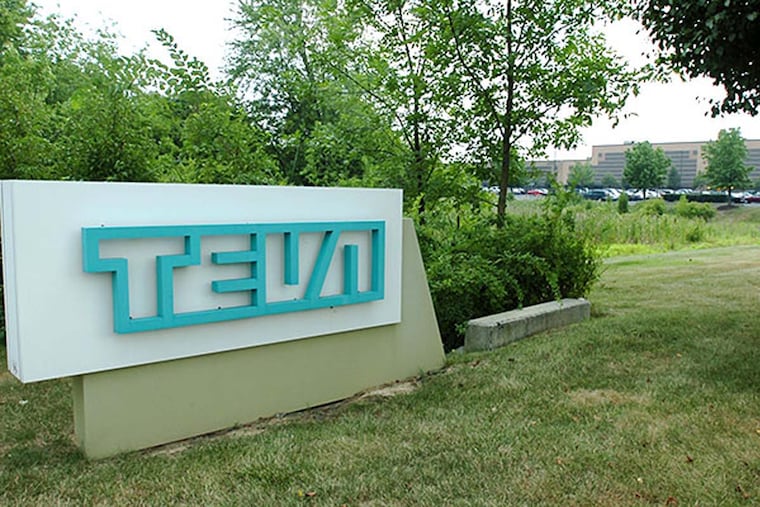Sex, drugs, and sharing trade secrets
Teva Pharmaceuticals has sued a former employee, alleging misappropriation of its trade secrets and confidential information to benefit a rival generic-drug company.

It went beyond shop talk to slipping confidential company information to a lover about medicines being developed, and those approved, for the public.
That's the allegation by Teva Pharmaceuticals USA against a former top executive in Horsham who is accused of sharing trade secrets and confidential business information with her boyfriend, the president and CEO of a rival generic-drug company, Apotex Inc.
Teva, the world's largest maker of generic pharmaceuticals, said the wrongdoing went beyond pillow talk to violations of the Defend Trade Secrets and Computer Fraud and Abuse Acts, according to a lawsuit filed in U.S. District Court in Philadelphia on July 7.
Barinder Sandhu was Teva's senior director of regulatory affairs for U.S. generics between 2014 and 2016 when, the lawsuit says, she used USB flash drives to download confidential files on her work-issued laptop, synced a folder titled "My Drive" with about 900 documents to a cloud-based account, and sent them to Jeremy Desai at his email account at Toronto-based Apotex, Canada's largest manufacturer of generic pharmaceuticals.
Sandhu, who was fired in October after the communications came to light, is named as a defendant in the lawsuit along with Desai and Apotex. Teva seeks a permanent injunction, unspecified damages, and the return of its confidential information.
The suit accuses Desai and Apotex of profiting from the proprietary information, including confidential communications with the U.S. Food and Drug Administration about Teva products.
"Teva alleges that Sandhu breached her confidentiality agreement with Teva USA" and the company's internal policies by intentionally "sharing this proprietary information with Desai and through him with Apotex, a direct competitor of Teva in the U.S.," said Teva spokeswoman Denise Bradley.
A spokesman for Apotex said the company was reviewing the claims. "We wholly deny that we acted improperly," said Jordan Berman, the company's head of global corporate communications.
Sandhu, who could not be reached for comment, lived on Cotswold Lane in Wynnewood while working in Horsham. Teva's North American headquarters is in North Wales.
According to court documents, the communications came to light after a former Apotex employee reported last summer that Desai and Apotex had openly discussed information about an unidentified drug, Product X, that Teva was developing and that competed with an Apotex product.
Sandhu was hired in May 2012 and moved from Brampton, Ontario, to work at Teva's Woodcliff Lake, N.J., office. She signed a confidentiality agreement, the lawsuit says. In early 2014, she transferred to Horsham and soon after was promoted to chief of regulatory affairs for U.S. generics, earning $193,000 plus a potential annual bonus of 30 percent of the base salary.
She and Desai were romantically involved at the time, the lawsuit says, and they lived together in Pennsylvania. No other personal information was disclosed.
In August 2014, Desai became president and CEO of Apotex, which has more than 10,000 employees and annual sales of about $2 billion. Teva, whose parent company, Teva Pharmaceutical Industries, is based in Israel, has about 57,000 employees and reported 2016 revenue of $21.9 billion.
The lawsuit seeks unspecified damages for Sandhu's alleged breach of her confidentiality agreement and from Desai and Apotex for "willful and malicious misappropriation" of trade secrets that "remain in the possession of the defendants."
The trade secrets included confidential communications with the FDA, details about the status of Teva products with the FDA, internal discussions about business strategies and personnel reorganization, and how Teva USA competes in the marketplace.
Teva manufactures hundreds of prescription pharmaceuticals, including medications for such conditions as attention-deficit disorder, gastrointestinal maladies, and pain, as well as antibiotics.
An internal investigation showed that Sandhu, from her company-issued laptop, emailed a "variety of documents," many marked "confidential," to Desai at Apotex and to herself at a personal Gmail account, the suit said. She created a folder on her Teva computer called My Drive, which synced to a personal cloud account that "she could access anywhere and share with whomever she chose," court papers said.
The My Drive folder contained about 900 Teva files uploaded between October 2014 and August 2016, the suit said. On Aug, 8, 2016, Sandhu uploaded an Excel spreadsheet detailing the regulatory status of "dozens of pre-approval and post-approval products and notes on confidential communications with the FDA regarding Teva USA's active drug submissions," according to the court filing.
Sandhu's company laptop showed that at least 10 USB flash drives were used during her employment. Teva said it was against company policies to copy files to external devices and to have a cloud backup on Teva laptop computers.
"Desai and Apotex, who are in the same industry as Teva USA and understand the confidential nature of certain communications, knew or should have known that Sandhu's sharing of the information was improper and unlawful," the complaint says.